Ukraine–European Union relations
[14] Prime Ministers Mateusz Morawiecki of Poland, Janez Janša of Slovenia and Petr Fiala of the Czech Republic, all being member states of the European Union, visited Kyiv and met with Ukrainian President Volodymyr Zelenskyy to express their solidarity and support during the invasion.Leaders focused chiefly on post-communism economic transition and human rights records as well as on issues connected to the Chernobyl nuclear power plant and its containment.[18] Ukrainian President Viktor Yushchenko asked Brussels mid-December 2004 for a clearer indication of Ukraine's prospects for membership, saying that, "The approved Action Plan reflects only the level of Ukraine–EU relations that we could have reached before the presidential elections in 2004.On 21 March 2005, Polish Foreign Minister Adam Daniel Rotfeld noted that Poland will, in every way, promote Ukraine's desire to be integrated with the EU, achieve the status of a market-economy country, and join the World Trade Organization.[16] After the Orange Revolution of 2004 that brought to power Viktor Yushchenko, the EU commission was very slow to react: little progress was made to put the largest European country on a path to eventual membership.[citation needed] In March 2007, the EU and Ukraine started talks about a new "wider agreement", aiming at offering a legal framework for a closer economic cooperation and a better political dialogue.It was based on the Partnership and Cooperation Agreement of 1994 and provided, according to the European Commission, a comprehensive and ambitious framework for joint of work with Ukraine in all key areas of reform."[27] On 4 June 2009, some media outlets reported that Germany's Free Democratic Party openly stated in its programme that Ukraine has the right for the EU membership in the long term.[29] In September 2009, high-ranking Ukrainian diplomats proposed that Ukraine apply for EU membership after the presidential election in January 2010, around March 2010, which would mean that the official response to the application would probably take place in early 2011 during the Polish presidency of the European Union.[51][52] The European Union and several of its member states, notably Germany, have been pressuring Ukrainian President Viktor Yanukovich and his Azarov Government to halt the detention of Tymoshenko in fear of her degrading health.[50][54][56] EU leaders have suggested that the AA, and the Deep and Comprehensive Free Trade Agreement, will not be ratified unless Ukraine addresses concerns over a "stark deterioration of democracy and the rule of law", including the imprisonment of Tymoshenko and Yurii Lutsenko in 2011 and 2012.[61] However, on 22 February 2013 a resolution was approved by 315 of the 349 registered members of the Verkhovna Rada stating that "within its powers" the parliament would ensure that 10 December 2012 EU Foreign Affairs Council "recommendations" are implemented.[67] On 3 September 2013, (at the opening session of the Verkhovna Rada after the summer recess) President Yanukovych urged his parliament to adopt laws so that Ukraine will meet the EU criteria and it can sign the Association Agreement in November 2013.[5] On 21 November 2013, the Verkhovna Rada failed to pass any of the six motions on allowing former Prime Minister Yulia Tymoshenko to receive medical treatment abroad, which was an EU demand for signing the association agreement.[72] Prime Minister Mykola Azarov issued the decree in order to "ensure the national security of Ukraine" and in consideration of the possible ramifications of trade with Russia (and other CIS countries[75]) if the agreement was signed on a 28–29 November summit in Vilnius.[3] On 2 December 2013, President of the European Commission José Manuel Barroso agreed to meet with a delegation from Ukraine to discuss closer ties with the EU but stated there would be no re-opening of negotiations on the proposed Association Agreement.[91] On 24 December 2013, Minister of Foreign Affairs of Ukraine Leonid Kozhara stated that "at the present time" his Ministry's "and other government agencies' efforts are focused on further negotiations with the EU to provide conditions for implementing the association agreement".[93] On 15 January 2014, Ukrainian Prime Minister Mykola Azarov gave an interagency (ministries and other agencies) working group two months to draw up a plan "on conditions of the implementation of the Association Agreement" for negotiations with the EU.EUAM Ukraine, employing over 300 personnel working in main headquarters in Kyiv, as well as in field offices in Lviv, Kharkiv and Odesa and a Mobile Unit today, provides strategic advice and practical support to Ukrainian counterparts.It was based on the Partnership and Cooperation Agreement of 1994 and provided, according to the European Commission, a comprehensive and ambitious framework for joint work with Ukraine in all key areas of reform.The Eastern Partnership is a forum aiming to improve the political and economic trade-relations of the six Post-Soviet states of "strategic importance"—Ukraine, Belarus, Moldova, Azerbaijan, Armenia and Georgia with the European Union.[116] The EU draft of the EaP states that, "Shared values including democracy, the rule of law, and respect for human rights will be at its core, as well as the principles of market economy, sustainable development and good governance."The AA aims for political association and economic integration, includes a "deep and comprehensive free trade area", and runs parallel to the negotiations for a visa-free regime.[29] 19 December 2011 EU-Ukraine summit, which was intended to lead to the signature of the Agreement, fell short due to the EU's concerns over the jailing of former premier Yulia Tymoshenko.The end of negotiations were announced, but the text of the agreement was not signed with EU leaders deciding to wait until the October 2012 Parliamentary elections as a test of the vitality of democracy and rule of law in Ukraine.[49][50] However, EU leaders have suggested that the agreement will not be ratified unless Ukraine addresses concerns over a "stark deterioration of democracy and the rule of law", including the imprisonment of Yulia Tymoshenko and Yurii Lutsenko in 2011 and 2012.However, on 9 October 2005, the European Commission, in a new version of the Development Strategy Paper, stated that the implementation of enlargement plans (Croatia and the former Yugoslav Republics) could block the accession of Ukraine, Belarus and Moldova."Any mention of the prospect of Ukraine's accession to the European Union has been excluded from the draft enhanced Ukraine-EU agreement due to France's position", wrote the influential German newspaper Frankfurter Allgemeine Zeitung.At the X session of the Ukraine-Poland-Lithuania Interparliamentary Assembly, which ended on 8 June 2019 in Kyiv, the parties signed a final document containing an agreement on the strategy of 2025 and 2027 as a period for Ukraine's possible accession to the EU.[275] On 24 May, the Council of the European Union adopted a regulation enabling for temporary trade liberalisation with Ukraine, interrupting all tariffs under Title IV of the association agreement, anti-dumping duties and the enforcement of common rules for imports.

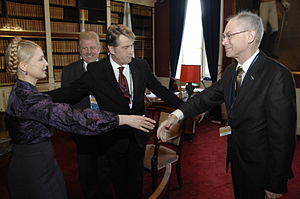
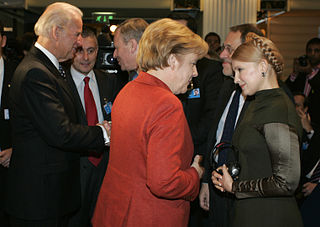
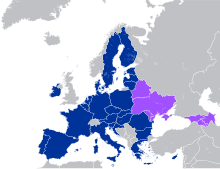
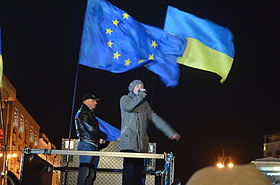
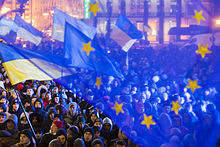
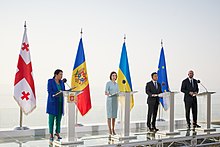

European Union
member states
European Union member states supporting accelerated granting of candidate status to Ukraine
Ukraine
Russian-occupied Ukrainian territories before 2022 full-scale invasion

Current members
Candidate countries
Applicant / potential candidate countries
Membership possible
Membership not possible
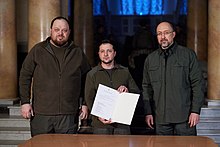

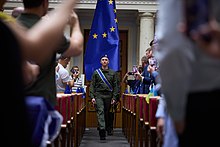

Accession of Ukraine to the European UnionEuropean UnionUkraineMission of Ukraine, BrusselsPolitics of UkraineConstitutionHuman rightsPresidentVolodymyr ZelenskyyOffice of the PresidentNational Security and Defence CouncilPresidential representativesPresidential symbolsPrime MinisterDenys ShmyhalCabinetShmyhal GovernmentVerkhovna Rada (parliament)ChairmanRuslan StefanchukCommitteesPeople's Deputy of UkraineImperative mandateJudiciaryConstitutional CourtSupreme CourtProsecutor GeneralLocal governmentAdministrative divisionsAutonomous republicsOblastsRaionsCitieswith special statusElectionsCentral Election CommissionPolitical partiesPresidentialParliamentary2014 (Kyiv)Referendums1991 (March)1991 (Dec)Foreign relationsMinistry of Foreign AffairsMinisterDmytro KulebaDiplomatic missions ofin UkraineNationality lawPassportVisa requirementsVisa policyInternational membershipUkraine–NATO relationsAustriaBelarusCanadaFinlandFranceGeorgiaGermanyGreeceIcelandLatviaLithuaniaMoldovaMontenegroPolandRomaniaRussiaSerbiaSlovakiaSouth AfricaSwedenTransnistriaUnited KingdomUnited StatesInternational organizationsDiplomatic missions of UkraineUkrainian nationalismDeclaration of IndependenceProclamation of IndependenceCassette ScandalUkraine without KuchmaOrange RevolutionRussia–Ukraine gas disputesUniversal of National UnityKharkiv PactAnnexation of Crimea by Russia2022 Russian invasionInternational relationsUkraine–European Union Association AgreementDeep and Comprehensive Free Trade AreaEastern PartnershipEuropean Neighbourhood PolicyEuropean Councilaccession to the European Unionpreparationsthe association agreementViktor YanukovychVilniusEuromaidangovernment2013–2014 Ukrainian revolutionArseniy YatsenyukPetro Poroshenkovisa-free travelSchengen AreaConstitution of Ukraine2022 Russian invasion of UkraineMateusz MorawieckiJanez JanšaSloveniaPetr Fialathe Czech RepublicUkrainian PresidentHungaryVolodymyr GroysmanJean-Claude JunckerBrusselsDonald TuskTymoshenkofossil energyPartnership and Cooperation AgreementVienna